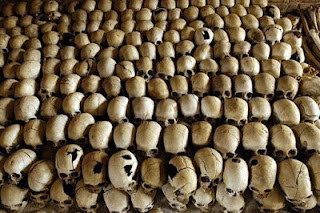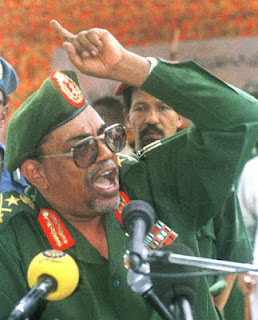
On 6 April 1994, Rwandese president Juvenal Habyarimana and Burundian
president Cyprien Ntaryamira were killed in a plane crash. The two were
travelling from Tanzania to Rwanda following a heads of state summit in
Dar es Salaam. After the crash widespread violence erupted in Rwanda
resulting in the deaths of approximately 800 000 people over the next
100 days. Although it has been alleged that the plane was shot down, to
date the perpetrators have not been identified. The targets of the
Rwandan genocide were predominantly from the Tutsi ethnic group,
although moderate individuals from the Hutu ethnic group who were
believed to be sympathetic to the then opposition Rwandese Patriotic
Front (RPF) were also among the victims.
Eighteen years after the genocide, the quest for justice for the
crimes committed in 1994 continues. An international criminal tribunal
was set up by the United Nations Security Council (UNSC) to prosecute
those who bore the greatest responsibility for the Rwandan genocide. To
date, the International Criminal Tribunal for Rwanda (ICTR) has dealt
with over 80 cases, securing convictions in 59 of these. The ICTR has
achieved important results as far as accountability for the genocide is
concerned. However, the tribunal has been criticized for taking too
long, being costly to run and prosecuting a small amount of people in
comparison to domestic justice processes in Rwanda. Furthermore, the
ICTR has been criticized for focusing its prosecutions on Hutus.
In addition to those prosecuted by the ICTR, the Rwandan local and
traditional gacaca courts have prosecuted hundreds of thousands of
individuals. The combined efforts of the ICTR, the local courts and the
gacaca have resulted in a unique and comprehensive approach to ensuring
justice for the crimes committed during the 1994 genocide. However,
despite overwhelming success, justice has largely remained one-sided and
slow. In a 2011 report on the gacaca, international human rights
organisation Human Rights Watch criticized the gacaca system and accused
the Rwandan government of political interference in the trials. In
addition, many senior officials believed to be behind the genocide
remain at large and in exile in other countries. These individuals, if
extradited to Rwanda, can only face trial before the High Court and not
the gacaca.Since 1995, the Rwandan government has sent over 40
extradition requests to various countries.
These requests for the extradition of individuals to Rwanda to stand
trial have largely been unsuccessful. However, recent events suggest
that those who remain at large could face trial in Rwanda at last.
On 24 January 2012, Canada deported alleged genocide suspect Leon
Mugesera back to Rwanda. Mugesera appeared before the Rwandan High Court
on 2 February 2012 where he was charged for his involvement in the 1994
genocide. Mugesera, a member of the MRND – the former ruling party in
Rwanda – is accused of inciting and planning the genocide. The charges
against Mugesera are based on a speech he gave at an MRND party meeting
in 1992, in which he called upon people from the majority Hutu ethnic
group to exterminate the minority Tutsis who he likened to cockroaches.
Mugesera’s case is the second high profile case that will be dealt
with by Rwandan domestic courts. His deportation came just days after
the ICTR handed over referral and prosecution materials in the case of
Jean Bosco Uwinkindi to the Rwandan courts. Uwinkindi is charged with
the crimes of genocide, conspiracy to commit genocide and extermination
as a crime against humanity for his involvement in atrocities in Kigal
Rural Prefecture.
Uwinkindi’s transfer is the first handover of a case by the ICTR to
the national courts of Rwanda. The Prosecutor of the ICTR, Hassan
Bubacar Jallow, regards the transfer of the Uwinkindi case as a
watershed moment for both the ICTR and Rwanda. Indeed, the transfer of
the Uwinkindi case to Rwanda is an important step in acknowledging the
ability of the Rwandan criminal justice system to deal with serious
crimes.
In addition to the cases of Mugesera and Uwinkindi, in 2011 the US
returned to Rwanda two genocide fugitives, Jean-Marie Vianney
Mudahinyuka and Marie-Claire Mukeshimana. More recently, the European
Court of Human Rights (ECHR) also approved the extradition of another
genocide suspect, Sylvere Ahorugeze, who is currently resident in
Sweden. The decision of the ECHR, although subject to review, is
important for international criminal justice as it has a broad impact,
particularly in Europe where it is believed hundreds of Rwandan genocide
suspects reside.
The decision of ECHR is the first of a regional human rights court on
the extradition of a genocide suspect to Rwanda. As such the judgment
sets a precedent for Rwanda to seek extradition of other suspects
resident abroad. This decision follows refusals by courts in Belgium,
Denmark, Finland, France, Germany, Switzerland, the Netherlands and the
United Kingdom to allow the extradition of genocide suspects to Rwanda.
Most of these decisions were based on the fact that the courts were not
satisfied that the Rwandan judiciary could guarantee a fair trial to
extradited genocide suspects.
It is no surprise therefore that the Prosecutor General of Rwanda,
Martin Ngoga, has applauded these recent decisions as evidence that the
international community believes in the Rwandan criminal justice system.
He credits the Rwandan government’s legal reforms for these positive
developments. Notably, in 2007 Rwanda abolished the death penalty.
Furthermore, since 2008 Rwanda has engaged in capacity building projects
aimed at enhancing the performance of the judiciary and ensuring
fairness and efficacy of the courts. In addition new courthouses and
detention facilities were constructed.

However, despite these recent decisions and the efforts of the
Rwandan government to reform the criminal justice system, concerns
remain. One of the major concerns relates to whether the Rwandan courts
have the requisite capacity to deal with the potential influx of high
profile cases. In addition, until recently most courts – the ICTR and
those in Europe – did not believe that the Rwandan courts would be able
to provide free and fair trials for genocide suspects. Perceptions are
changing, albeit slowly. The satisfactory performance of the Rwandan
courts will be particularly important for Rwanda’s continued efforts to
ensure accountability given that both the ICTR and the gacaca courts
will end trials in mid-2012. As a result, the latest genocide trials in
Rwanda will be watched closely as they will be the litmus test for any
future extraditions or transfers to Rwanda.
ISS Today article written by Ottilia Anna Maunganidze,
Researcher, Transnational Threats and International Crime Division, ISS
Pretoria
ISS Africa






